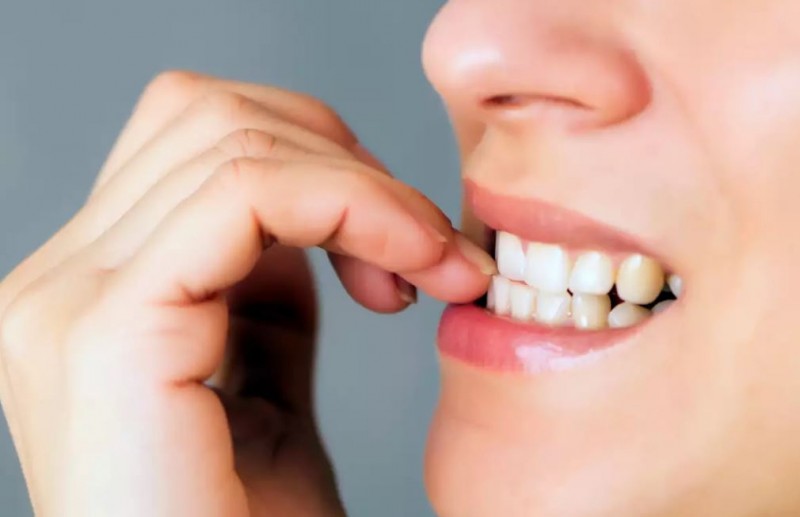
Many times, it has been observed that despite not wanting to, we cannot resist the habit of biting our nails. This habit is often found in many people. Are you one of those who cannot protect themselves from such habits? If so, it is important to be aware of the dangers associated with these habits. Let's learn about the risks associated with nail biting and cutting. Nail biting can increase the risk of paronychia, nail infections, and other health hazards. Symptoms of paronychia include red and swollen nails. Additionally, nail-biting can cause significant harm to your overall health, increasing the risk of various diseases. Furthermore, nail-biting is also harmful to your hair and teeth. Let's understand the effects of infections caused by nail cutting or biting on our bodies.
Nail Biting is Harmful for Teeth:
Nail biting is a common habit that can have detrimental effects not only on the nails but also on oral health. When individuals bite their nails, they subject their teeth to unnatural forces that can lead to various dental issues. The repetitive pressure from nail biting can cause the teeth to shift from their original position, leading to misalignment. In some cases, this misalignment may necessitate the use of orthodontic appliances such as braces or retainers to correct the positioning of the teeth.
Furthermore, the act of nail biting can potentially result in tooth breakage or chipping. The hard texture of the nails can cause damage to the tooth enamel, the protective outer layer of the teeth. Over time, this can weaken the enamel, making the teeth more susceptible to decay and cavities. Additionally, the bacteria present under the nails can transfer to the mouth, potentially leading to infections in the gums or oral cavity. These infections can cause discomfort, swelling, and even more severe dental complications if left untreated. Therefore, curbing the habit of nail biting is essential for maintaining optimal oral health and preventing potential dental issues.
Infections from Hangnails:
Hangnails, the small pieces of torn skin at the base of the nails, can pose a significant risk of infection if not handled properly. While hangnails might seem like a minor annoyance, they can lead to painful and potentially severe consequences if left untreated. People who frequently cut their nails too short are more prone to developing hangnails. These open wounds provide an entry point for bacteria, increasing the risk of infection.
Proper nail care and hygiene are crucial in preventing the occurrence of hangnails. Regular moisturization of the hands and nails can help to keep the skin around the nails soft and supple, minimizing the chances of developing hangnails. It is essential to resist the urge to bite or pick at hangnails, as this can further exacerbate the condition and lead to more significant complications. In case of any signs of infection, such as redness, swelling, or pain, seeking prompt medical attention is crucial to prevent the spread of the infection and to ensure proper treatment.
Harmful Habit of Nail Biting After Applying Nail Polish:
Applying nail polish is a common practice among individuals who seek to enhance the appearance of their nails. However, the habit of nail biting can pose additional risks, especially after applying nail polish. Nail polish often contains a variety of chemical compounds and toxins that can be harmful if ingested. These substances are not meant for internal consumption and can potentially lead to adverse health effects if accidentally ingested through nail biting.
Moreover, biting nails with nail polish can also result in the ingestion of small paint chips or particles, which may contain harmful substances. Some of these substances can be toxic and can have adverse effects on the body if absorbed. Ingesting nail polish can also lead to gastrointestinal disturbances, causing discomfort, nausea, or other digestive issues. Therefore, it is crucial to break the habit of nail biting, especially after applying nail polish, to avoid the ingestion of harmful chemicals and to maintain overall well-being. Regularly using non-toxic and high-quality nail polish can also help minimize potential risks associated with nail biting after applying nail polish.
The habit of nail biting can pose significant risks to your overall health. It can lead to several infections and complications, affecting not just your nails but also your teeth and general well-being. Hence, it is crucial to break this habit for a healthier lifestyle.
Mindful Movement: Nurturing the Soul through Fitness and Wellness
You Are What You Eat Follow These Tips for Cleaning Up Your Plate